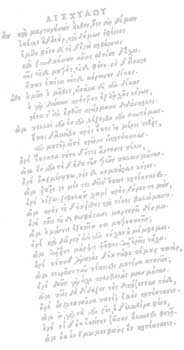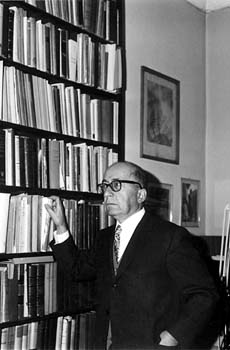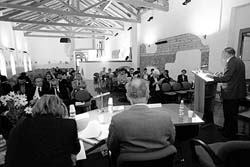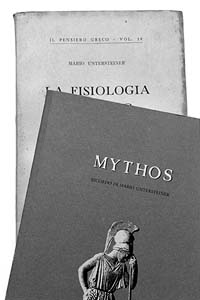 Aeschylus: Aeschylus:
when to emend
and when not to emend
di Alex Garvie, University of Glasgow

 I have recently been reading with great interest the
volume of the Proceedings of a Conference held in this
University and at Rovereto in 1999 to mark the centenary of the birth of
Mario Untersteiner. Some of the papers delivered at that Conference
dealt sympathetically with Untersteiner's conservatism as a textual critic
of Aeschylus, and I have a great deal of sympathy for that myself, as I
have always considered myself to be at least moderately conservative when
it comes to textual criticism.
I have recently been reading with great interest the
volume of the Proceedings of a Conference held in this
University and at Rovereto in 1999 to mark the centenary of the birth of
Mario Untersteiner. Some of the papers delivered at that Conference
dealt sympathetically with Untersteiner's conservatism as a textual critic
of Aeschylus, and I have a great deal of sympathy for that myself, as I
have always considered myself to be at least moderately conservative when
it comes to textual criticism.
In his Repertory of conjectures on
Aeschylus (p. 3) Roger Dawe estimated that between Wecklein's
Appendix and the publication of his own book in 1965 some 20,000 conjectures
had been published, of which only 0.1% might be thought `to have hit the truth'.
Since 1965 emendation has continued unabated, and there is no good
reason to suppose that the proportion of successful, or at least
generally accepted, conjectures has grown any higher. We can all name critics
who emended a text simply because they were clever enough to think of
what seemed to them to be an improvement.
 |
 |
Sopra: lo studioso roveretano
Mario Untersteiner
Sotto: i volumi: La fisiologia
del mito di Mario Untersteiner
pubblicato dai fratelli Bocca,
Milano, nel 1946;
Mithos, Ricordo di Mario Untersteiner,
pubblicato nel supplemento
n. 1/1991 di Materiali di lavoro

|
 |
 |
|
Alex F. Garvie è stato Professor of Classics all'Università di Glasgow. Allievo
del grande ellenista Denis L. Page, è autore tra l'altro di
importanti lavori sul teatro greco, come un saggio sulle
Supplici di Eschilo (Cambridge 1969), commenti alle
Coefore di Eschilo (Oxford 1986) e all'Aiace
di Sofocle (Warminster 1998).
|
 |
In a very few cases these improvements may really be improvements,
and Aeschylus, if he has access to modern editions of his plays in the Isles of
the Blest, may well be regretting that he did not think of them himself. I
agree entirely with Angelo Casanova and Vittorio Citti, that the
difficulties experienced by scholars often derive from their failure to recognise
that modern sensibility may be alien to that of a fifth-century B.C. poet, that the
logic of poetry, and especially of Aeschylus, may be different from that of
rational prose discourse, and that the richness of Aeschylus' imagery and the
density of his language are not to be smoothed out by attempts at simplification
and normalisation. There should be no doubt that Aeschylus
is a difficult writer, and it is clear from
Frogs of Aristofanes that he was already seen to be so at
least by the end of the fifth century. We do him no service by trying to eliminate
all of the difficulties in his text. It is
therefore tempting to rely upon our manuscripts when there is consensus among
them, although, of course, when they disagree, choices have to be made.
It is here, however, that my worries arise. Anyone who considers the
numerous occasions in the Byzantine triad on which the Mediceus gives an
inferior reading to other manuscripts will feel that in
Supplices and Choephori, where it is the only manuscript, it is unlikely
to be a reliable guide. But in the other plays too, where there is
manuscript disagreement, there is no logical
reason why any of them must have preserved the truth.
They may all represent attempts to make sense of a deep-seated
corruption. And even a consensus among the manuscripts does not necessarily mean
that they preserve the truth. The whole tradition may still be corrupt. Of
course our starting-point must be the manuscript tradition, but
we sometimes, I think, forget that our primary duty as textual critics is not
to make sense of it at all costs, but to determine
what Aeschylus in fact wrote.
 |
 |
 |
Il convegno Ecdotica ed esigesi eschilea,
Trento, 5-7 ottobre 2000
 |
Often it will be impossible to do
this with any certainty, but that does not set us
free from the obligation to attempt it. I see no
point, then, in denying that, while it is true that Aeschylus is
a difficult writer, at the same time his text is highly corrupt.
To some extent the latter is a consequence of the former. It
is often the difficulties that have led to the corruption.
 |
| Si ricorda che di recente è stato pubblicato, sulla Rivista di Storia della Filosofia n.2, 2000, un interessante articolo sullo studioso roveretano a cura di Livio Sichirollo, intitolato Per Mario Untersteiner. |
|
In his interesting Commentary on the parodos of
Choephori, first published in the 1999
Centenary volume, Untersteiner himself remarks (p. 421) of the very
difficult epode (75-83) that in his opinion one
must (my italics) follow substantially the manuscript text with only one
or two minor modifications.
In my own Commentary on 78-81 I remarked that `some sort of sense
can be extracted' from M's text, but went on to argue that that sense
was unsatisfactory and the language excessively strained. Many of us,
and I include myself, have found ourselves writing something like
'emendation here is unnecessary'.
 We should ask ourselves what we mean by this. If we are saying
not only that the transmitted text makes sense, but also that it makes the
best sense in its context and that of the play as a whole, that it is in
accordance with everything that we know Aeschylus' style, and so is
probably what Aeschylus wrote, then we are justified in saying it. If, however,
we mean that because it is the transmitted text it is
ipso facto preferable to a conjecture that makes better
sense, we are on much shakier ground. We should ask ourselves what we mean by this. If we are saying
not only that the transmitted text makes sense, but also that it makes the
best sense in its context and that of the play as a whole, that it is in
accordance with everything that we know Aeschylus' style, and so is
probably what Aeschylus wrote, then we are justified in saying it. If, however,
we mean that because it is the transmitted text it is
ipso facto preferable to a conjecture that makes better
sense, we are on much shakier ground.
The question that we should be asking is not `how can we save
the manuscript reading, but how hard should we try?'
Nor is it safe to assume that corruption is always
clearly betrayed by a text that makes no, or inadequate, sense, or is simply
written in bad Greek.
Many, perhaps not all, copyists were perfectly capable of writing
respectable Greek and could scan at least iambic
trimeters. They wrote what, in most cases, seemed to them to make
sense, but that does not necessarily mean that it was the sense which
Aeschylus intended. For all we know, there may be lines in our texts which have
never been suspected, but which are nevertheless corrupt.

|
 Aeschylus:
Aeschylus:
 We should ask ourselves what we mean by this. If we are saying
not only that the transmitted text makes sense, but also that it makes the
best sense in its context and that of the play as a whole, that it is in
accordance with everything that we know Aeschylus' style, and so is
probably what Aeschylus wrote, then we are justified in saying it. If, however,
we mean that because it is the transmitted text it is
ipso facto preferable to a conjecture that makes better
sense, we are on much shakier ground.
We should ask ourselves what we mean by this. If we are saying
not only that the transmitted text makes sense, but also that it makes the
best sense in its context and that of the play as a whole, that it is in
accordance with everything that we know Aeschylus' style, and so is
probably what Aeschylus wrote, then we are justified in saying it. If, however,
we mean that because it is the transmitted text it is
ipso facto preferable to a conjecture that makes better
sense, we are on much shakier ground.